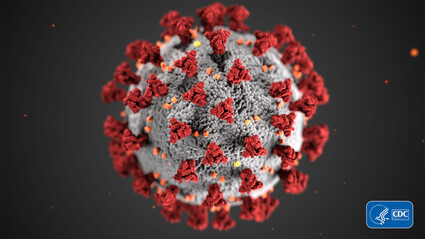State expands reach about long Covid
April 14, 2023
The Minnesota Department of Health is extending its long-Covid work this year with the aim to increase knowledge, awareness and resources for the condition among the public and providers.
The effects of Covid-19 can vary greatly, from cold and flu-like symptoms to life-threatening complications. Recovery can be similarly complicated. Not everyone who contracts Covid-19 makes a fast or full recovery. Tens of thousands of Minnesotans face ongoing or new symptoms such as shortness of breath, extreme fatigue, headaches, dizziness, brain fog and more. This is known as long Covid, and even mild infections or reinfections can lead to symptoms that may last for months or years.
Long Covid can be as unpredictable as it is debilitating. Although it's more common in adults, teens and children can be affected. Some people with long Covid struggle with work, school, family life, education and daily tasks. This impacts their financial stability, quality of life and mental health.
Annette, who is in her mid-30s and was previously healthy, has been disabled from long Covid for nearly three years. She says that if it were not for her savings, which are now gone, she would have ended up homeless after losing her job and facing mounting medical costs. "It's expensive to be this sick," she said.
Steve, a 70-year-old retired law enforcement officer from Glencoe, has struggled with long Covid since 2020. "Prior to Covid-19, I was in good health. I used to walk across my 10-acre hobby farm from one corner to the other," he recalls. "Now, because of problems with my balance, breathing and heart, I need to take the tractor. It has changed my lifestyle, my medical needs and my mobility."
With appropriate medical care, many people can manage their symptoms and improve their health and quality of life. Unfortunately, all too often Minnesotans experiencing lasting symptoms after a Covid-19 infection do not recognize they are experiencing long Covid. Additionally, treating long Covid can require specialists and ongoing follow up that is not always accessible, especially for those already experiencing health inequities and barriers to care.
To better understand the lasting effects of Covid-19 on the lives of Minnesotans, MDH has launched two post-Covid random phone surveys among people who have had Covid-19, one statewide and one in McLeod County. The surveys will explore long-term symptoms Minnesotans are facing since being infected and how they have affected their lives. Results of the surveys are expected to be available later this year and will be used to identify and guide future MDH actions to address long Covid.
Because the virus that causes Covid-19 is not going away, long Covid will continue to impact Minnesotans, the state's workforce and the economy for the foreseeable future. It is critical that providers are up to date on the latest research, treatments and best practices so Minnesotans have access to the care and services they need to reduce the impact of long Covid.
Covid Council
The Minnesota Department of Health has teamed up with Stratis Health and consultants from the former Institute for Clinical Systems Improvement (ICSI) to form a network of 20 primary care providers and specialists who are treating long Covid patients from across the state of Minnesota.
Facilitated by MDH's long Covid team, this network of 20 clinicians is known as the Long Covid Guiding Council. Its members represent a diverse array of medical settings including community clinics, safety net hospitals, long Covid specialty centers, rural health systems and academic health centers. The focus of the council will be to develop strategies to educate providers and help them implement processes and policies that will improve access and quality of long-Covid care.
"Making sure we prevent disparities in access to diagnosis, treatment and supports for long Covid is critical," said Dr. Nathan Chomilo, medical director for Medicaid and MinnesotaCare at the Minnesota Department of Human Services. "For Minnesotans served by our Medicaid program, that starts with ensuring that recognition and diagnosis captures how long Covid may compound challenges they already face and includes ensuring the supports and services that they need are covered."
There is still much that is unknown about long Covid. To address this, the Guiding Council meets monthly to discuss emerging evidence, treatment and current practices. In developing guidance, they will incorporate broader stakeholder input from patients, caregivers, nurses, community health workers and community leaders.
"Clinicians are telling us that there is very little communication among the care providers who see long-Covid patients in Minnesota and that a coordinated learning network would increase access to care and the quality of care that is provided," said Dr. Ruth Lynfield, state epidemiologist and medical director at the Minnesota Department of Health.
MDH's long Covid program is currently funded by a Centers for Disease Control and Prevention Covid and Health Equity grant through June of 2023.
Find out more at http://www.health.state.mn.us/diseases/longcovid.



